Case Study: Optimizing CommonMark Markdown Parser with Blackfire.io

Key Takeaways
- The CommonMark Markdown parser, developed by the PHP League, prioritizes extensibility over performance, resulting in a decoupled object-oriented design that users can easily customize. However, they also aimed to optimize the parser as much as possible without compromising their primary goals.
- Blackfire.io was used to identify and optimize two performance issues found in the CommonMark parser. Blackfire.io is a tool from SensioLabs that provides an easy-to-digest performance trace of your application’s request, allowing users to identify areas for optimization.
- The first optimization involved reducing the number of calls to the Cursor::getCharacter() method, resulting in an 11% overall performance boost. The second optimization reduced the number of calls to the NewlineParser::parse() method by 87%, decreasing general inline parsing time by 61% and improving overall parsing speed by 23%.
- The combined effect of both optimizations resulted in a 52.5% performance boost for the CommonMark parser. The author stresses that profiling is critical for ensuring code runs efficiently and recommends Blackfire.io as a useful tool for this purpose.
As you may know, I am the author and maintainer of the PHP League‘s CommonMark Markdown parser. This project has three primary goals:
- fully support the entire CommonMark spec
- match the behavior of the JS reference implementation
- be well-written and super-extensible so that others can add their own functionality.
This last goal is perhaps the most challenging, especially from a performance perspective. Other popular Markdown parsers are built using single classes with massive regex functions. As you can see from this benchmark, it makes them lightning fast:
| Library | Avg. Parse Time | File/Class Count |
|---|---|---|
| Parsedown 1.6.0 | 2 ms | 1 |
| PHP Markdown 1.5.0 | 4 ms | 4 |
| PHP Markdown Extra 1.5.0 | 7 ms | 6 |
| CommonMark 0.12.0 | 46 ms | 117 |
Unfortunately, because of the tightly-coupled design and overall architecture, it’s difficult (if not impossible) to extend these parsers with custom logic.
For the League’s CommonMark parser, we chose to prioritize extensibility over performance. This led to a decoupled object-oriented design which users can easily customize. This has enabled others to build their own integrations, extensions, and other custom projects.
The library’s performance is still decent — the end user probably can’t differentiate between 42ms and 2ms (you should be caching your rendered Markdown anyway). Nevertheless, we still wanted to optimize our parser as much as possible without compromising our primary goals. This blog post explains how we used Blackfire to do just that.
Profiling with Blackfire
Blackfire is a fantastic tool from the folks at SensioLabs. You simply attach it to any web or CLI request and get this awesome, easy-to-digest performance trace of your application’s request. In this post, we’ll be examining how Blackfire was used to identify and optimize two performance issues found in version 0.6.1 of the league/commonmark library.
Let’s start by profiling the time it takes league/commonmark to parse the contents of the CommonMark spec document:
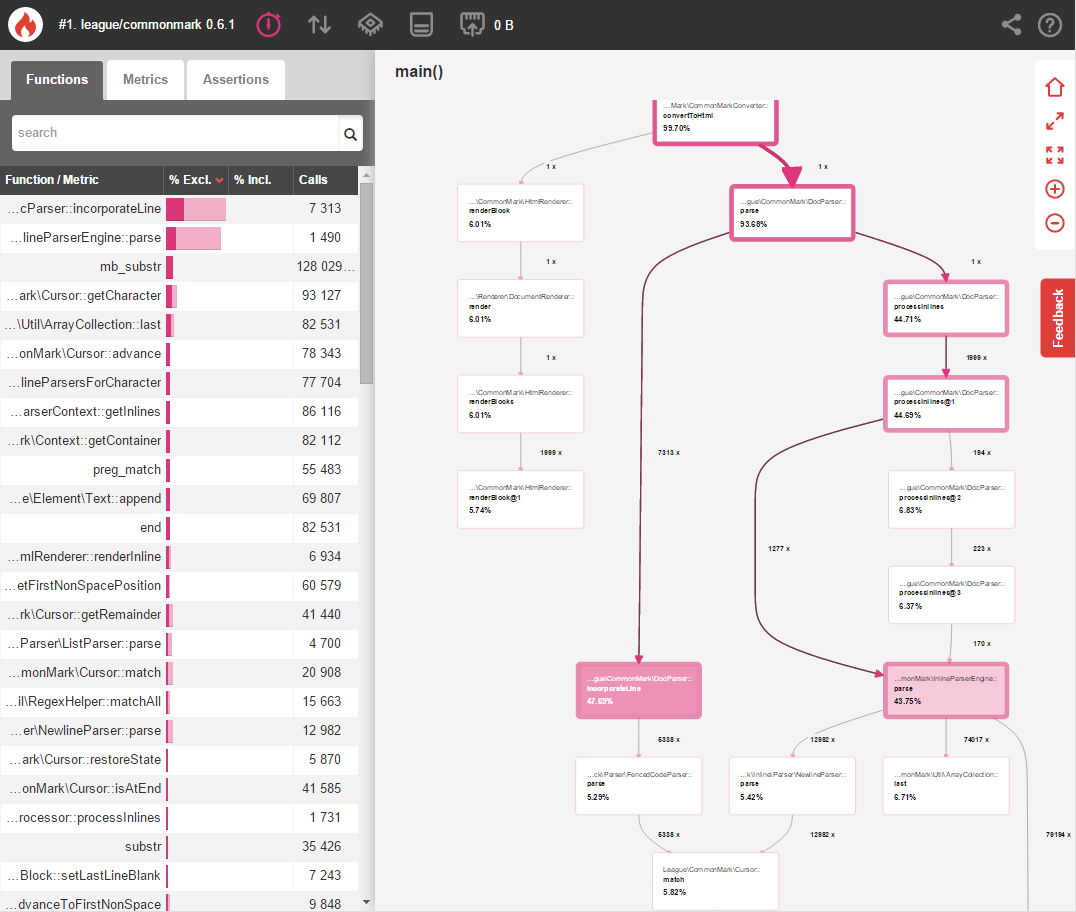
Later on we’ll compare this benchmark to our changes in order to measure the performance improvements.
Quick side-note: Blackfire adds overhead while profiling things, so the execution times will always be much higher than usual. Focus on the relative percentage changes instead of the absolute “wall clock” times.
Optimization 1
Looking at our initial benchmark, you can easily see that inline parsing with InlineParserEngine::parse() accounts for a whopping 43.75% of the execution time. Clicking this method reveals more information about why this happens:
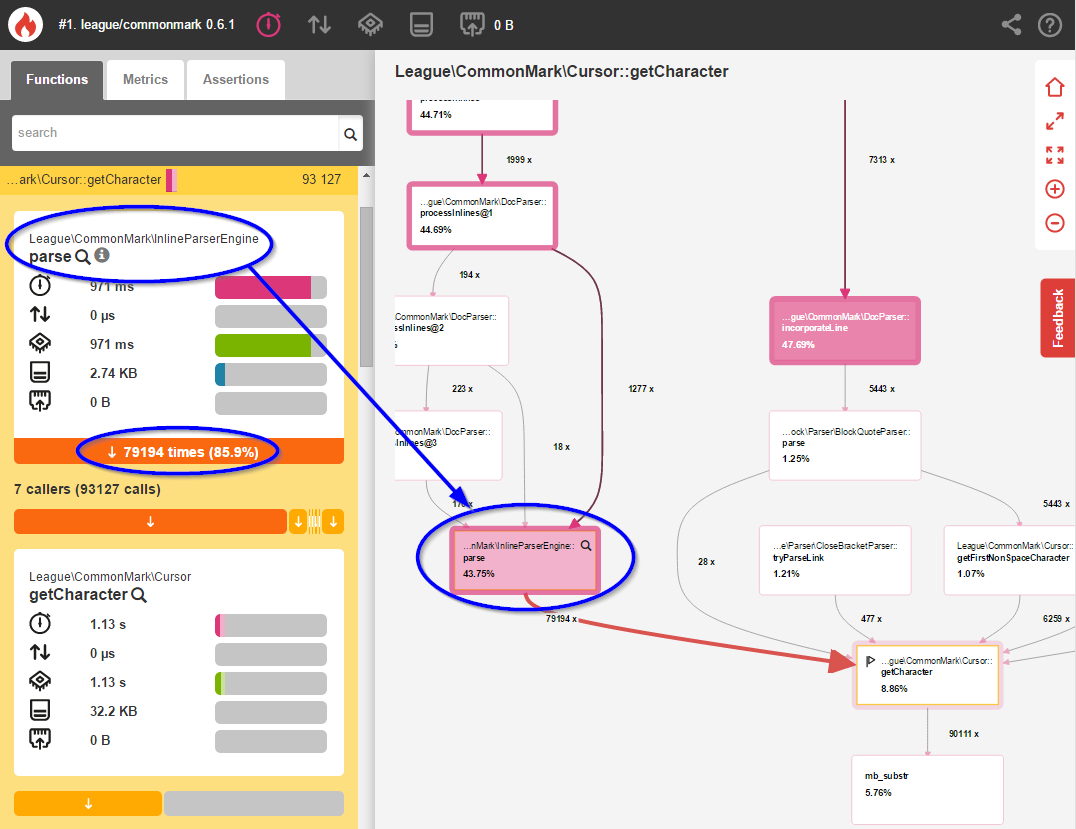
Here we see that InlineParserEngine::parse() is calling Cursor::getCharacter() 79,194 times — once for every single character in the Markdown text. Here’s a partial (slightly-modified) excerpt of this method from 0.6.1:
public function parse(ContextInterface $context, Cursor $cursor)
{
// Iterate through every single character in the current line
while (($character = $cursor->getCharacter()) !== null) {
// Check to see whether this character is a special Markdown character
// If so, let it try to parse this part of the string
foreach ($matchingParsers as $parser) {
if ($res = $parser->parse($context, $inlineParserContext)) {
continue 2;
}
}
// If no parser could handle this character, then it must be a plain text character
// Add this character to the current line of text
$lastInline->append($character);
}
}
Blackfire tells us that parse() is spending over 17% of its time checking every. single. character. one. at. a. time. But most of these 79,194 characters are plain text which don’t need special handling! Let’s optimize this.
Instead of adding a single character at the end of our loop, let’s use a regex to capture as many non-special characters as we can:
public function parse(ContextInterface $context, Cursor $cursor)
{
// Iterate through every single character in the current line
while (($character = $cursor->getCharacter()) !== null) {
// Check to see whether this character is a special Markdown character
// If so, let it try to parse this part of the string
foreach ($matchingParsers as $parser) {
if ($res = $parser->parse($context, $inlineParserContext)) {
continue 2;
}
}
// If no parser could handle this character, then it must be a plain text character
// NEW: Attempt to match multiple non-special characters at once.
// We use a dynamically-created regex which matches text from
// the current position until it hits a special character.
$text = $cursor->match($this->environment->getInlineParserCharacterRegex());
// Add the matching text to the current line of text
$lastInline->append($character);
}
}
Once this change was made, I re-profiled the library using Blackfire:
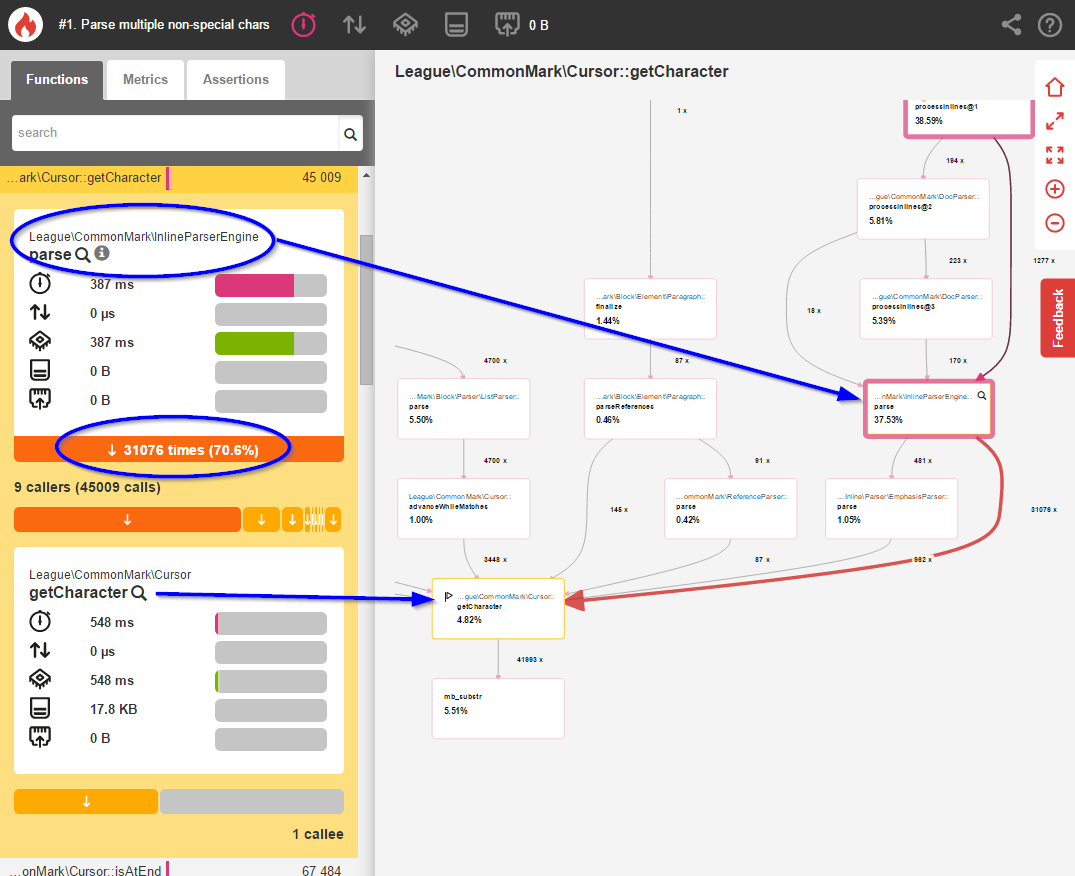
Okay, things are looking a little better. But let’s actually compare the two benchmarks using Blackfire’s comparison tool to get a clearer picture of what changed:
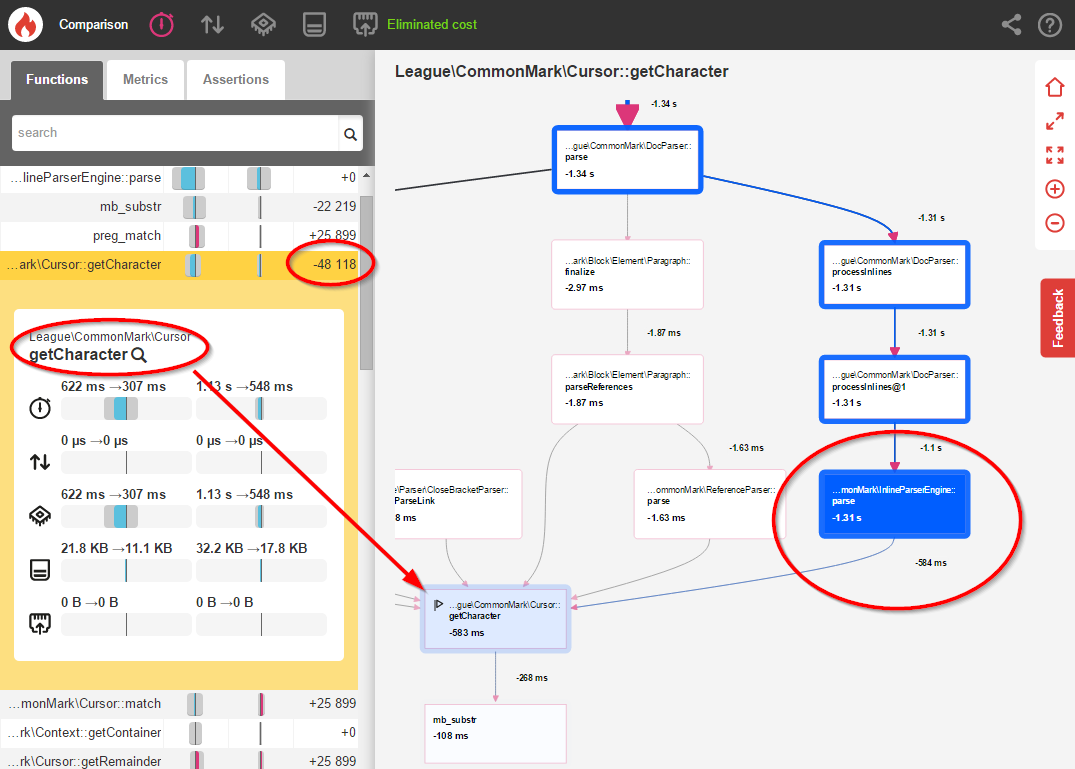
This single change resulted in 48,118 fewer calls to that Cursor::getCharacter() method and an 11% overall performance boost! This is certainly helpful, but we can optimize inline parsing even further.
Optimization 2
According to the CommonMark spec:
A line break … that is preceded by two or more spaces … is parsed as a hard line break (rendered in HTML as a
tag)
Because of this language, I originally had the NewlineParser stop and investigate every space and \n character it encountered. Here’s an example of what that original code looked like:
class NewlineParser extends AbstractInlineParser {
public function getCharacters() {
return array("\n", " ");
}
public function parse(ContextInterface $context, InlineParserContext $inlineContext) {
if ($m = $inlineContext->getCursor()->match('/^ *\n/')) {
if (strlen($m) > 2) {
$inlineContext->getInlines()->add(new Newline(Newline::HARDBREAK));
return true;
} elseif (strlen($m) > 0) {
$inlineContext->getInlines()->add(new Newline(Newline::SOFTBREAK));
return true;
}
}
return false;
}
}
Most of these spaces weren’t special, and it was therefore wasteful to stop at each one and check them with a regex. You can easily see the performance impact in the original Blackfire profile:
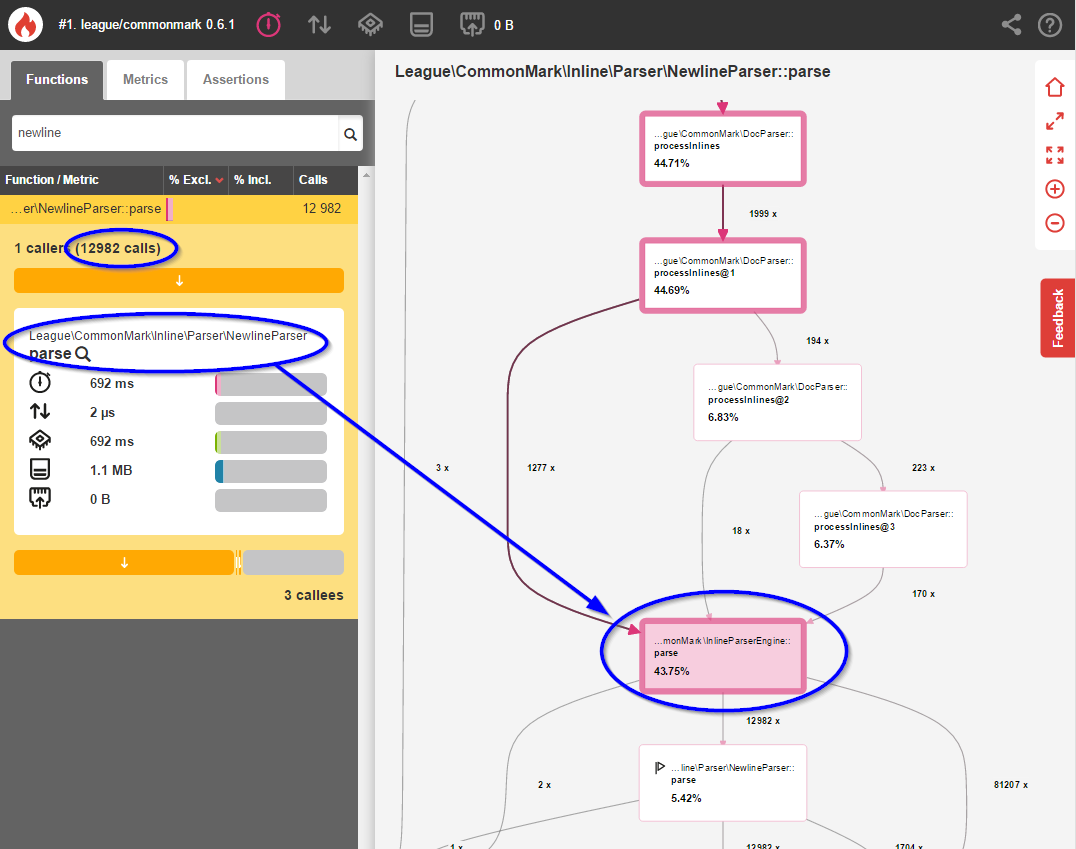
I was shocked to see that 43.75% of the ENTIRE parsing process was figuring out whether 12,982 spaces and newlines should be converted to <br> elements. This was totally unacceptable, so I set out to optimize this.
Remember that the spec dictates that the sequence must end with a newline character (\n). So, instead of stopping at every space character, let’s just stop at newlines and see if the previous characters were spaces:
class NewlineParser extends AbstractInlineParser {
public function getCharacters() {
return array("\n");
}
public function parse(ContextInterface $context, InlineParserContext $inlineContext) {
$inlineContext->getCursor()->advance();
// Check previous text for trailing spaces
$spaces = 0;
$lastInline = $inlineContext->getInlines()->last();
if ($lastInline && $lastInline instanceof Text) {
// Count the number of spaces by using some `trim` logic
$trimmed = rtrim($lastInline->getContent(), ' ');
$spaces = strlen($lastInline->getContent()) - strlen($trimmed);
}
if ($spaces >= 2 ) {
$inlineContext->getInlines()->add(new Newline(Newline::HARDBREAK));
} else {
$inlineContext->getInlines()->add(new Newline(Newline::SOFTBREAK));
}
return true;
}
}
With that modification in place, I re-profiled the application and saw the following results:
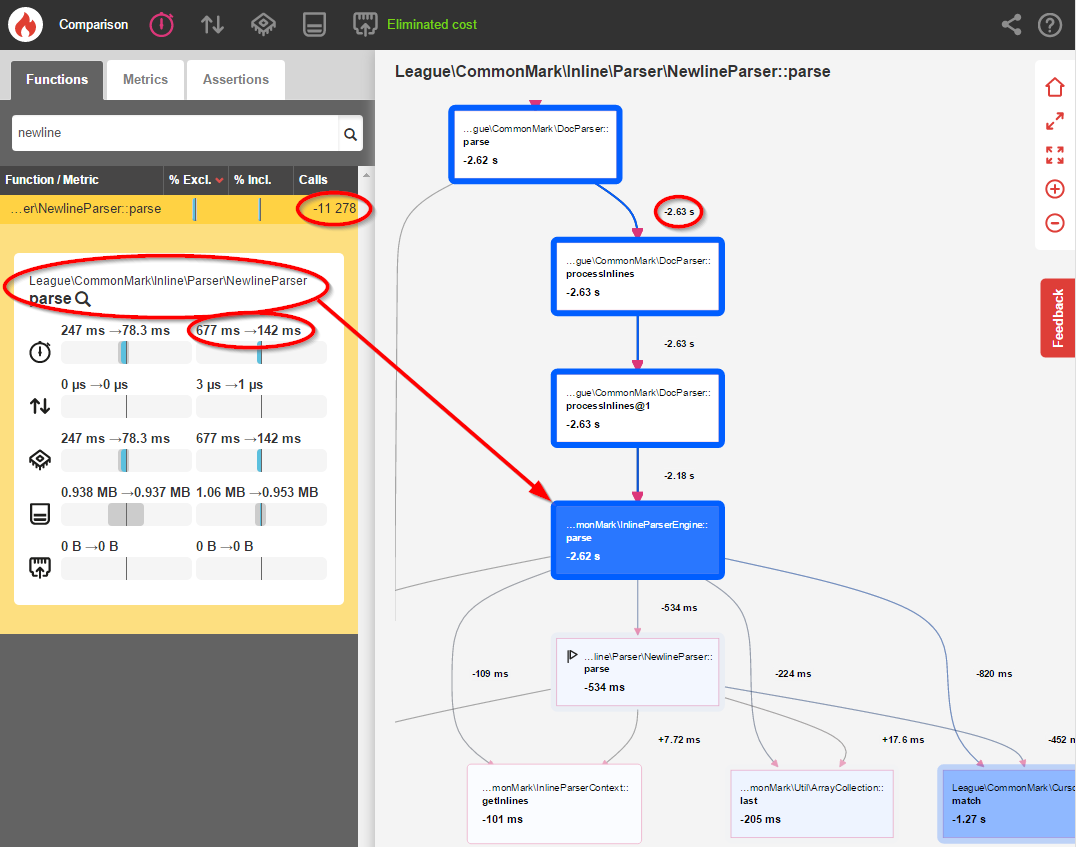
NewlineParser::parse()is now only called 1,704 times instead of 12,982 times (an 87% decrease)- General inline parsing time decreased by 61%
- Overall parsing speed improved by 23%
Summary
Once both optimizations were implemented, I re-ran the league/commonmark benchmark tool to determine the real-world performance implications:
- Before:
- 59ms
- After:
- 28ms
That’s a whopping 52.5% performance boost from making two simple changes!
Being able to see the performance cost (in both execution time and number of function calls) was critical to identifying these performance hogs. I highly doubt these issues would’ve been noticed without having access to this performance data.
Profiling is absolutely critical to ensuring that your code runs fast and efficiently. If you don’t already have a profiling tool then I highly recommend you check them out. My personal favorite happens to be Blackfire (which is “freemium”), but there other profiling tools out there too. All of them work slightly differently, so look around and find the one that works best for you and your team.
An unedited version of this post was originally published on Colin’s blog. It was republished here with the author’s permission.
Frequently Asked Questions (FAQs) about Optimizing League with CommonMark and Blackfire.io
What is the purpose of using Blackfire.io in optimizing League with CommonMark?
Blackfire.io is a performance management solution that helps in the optimization process by providing a detailed performance profile of the PHP code. It allows developers to understand how their code behaves and how resources are being used. This way, they can identify bottlenecks, inefficient processes, and areas that need improvement. It’s a valuable tool in optimizing League with CommonMark as it provides insights that can lead to significant performance improvements.
How does CommonMark differ from other markdown parsers?
CommonMark is a highly extensible markdown parser for PHP that adheres to the CommonMark spec. It’s designed to be more robust and flexible than other markdown parsers. It provides a standardized specification for markdown files, ensuring consistency and compatibility across different platforms and applications. This makes it a preferred choice for developers who want to ensure their markdown files are universally readable.
Why is it important to optimize League with CommonMark?
Optimizing League with CommonMark is crucial for improving the performance and efficiency of your PHP applications. It allows for faster parsing of markdown files, reducing the load on your server and improving the overall user experience. Additionally, optimization can lead to cleaner, more maintainable code, making it easier for developers to work with and update in the future.
How can I start using Blackfire.io for my PHP applications?
To start using Blackfire.io, you need to install the Blackfire agent, PHP probe, and browser extension. Once installed, you can start profiling your PHP applications by clicking on the Blackfire icon in your browser toolbar. This will generate a performance profile that you can analyze to identify areas for optimization.
What are the benefits of adhering to the CommonMark spec?
Adhering to the CommonMark spec ensures that your markdown files are universally readable and compatible across different platforms and applications. It provides a standardized specification for markdown files, reducing the risk of inconsistencies and compatibility issues. This can lead to improved efficiency and productivity for developers, as they can be confident that their markdown files will be correctly parsed and displayed.
How does Blackfire.io help in identifying bottlenecks in my PHP code?
Blackfire.io provides a detailed performance profile of your PHP code, showing how resources are being used and how your code behaves. It identifies areas where your code is using more resources than necessary or where processes are taking longer than they should. By identifying these bottlenecks, you can focus your optimization efforts where they will have the most impact.
Can I use CommonMark for other programming languages apart from PHP?
Yes, CommonMark is a language-independent specification for markdown files. While the League’s CommonMark parser is designed for PHP, there are CommonMark parsers available for a variety of other programming languages, including JavaScript, Python, and Ruby.
How can I ensure that my markdown files are compatible with CommonMark?
To ensure compatibility with CommonMark, you should adhere to the CommonMark spec when writing your markdown files. This includes following the correct syntax for headings, lists, links, and other markdown elements. You can also use a CommonMark parser to check your files for compatibility issues.
What are the key features of Blackfire.io that make it suitable for PHP code optimization?
Blackfire.io offers several key features that make it suitable for PHP code optimization. These include detailed performance profiling, automatic performance testing, and performance recommendations. It also provides a visual timeline of your code’s execution, making it easier to identify bottlenecks and areas for improvement.
How does optimizing League with CommonMark improve the user experience?
Optimizing League with CommonMark can lead to faster parsing of markdown files, reducing the load on your server and improving response times. This can lead to a smoother, more responsive user experience. Additionally, by adhering to the CommonMark spec, you can ensure that your markdown files are consistently displayed across different platforms and applications, leading to a more predictable and reliable user experience.
Colin O'Dell is the Lead Web Developer at Unleashed Technologies, a web and hosting firm based in Maryland. He began programming at age 8, co-founded a local web shop at 15, and has over 10 years of professional experience with PHP. In addition to being an active member of the PHP League and maintainer of the league/commonmark project, Colin is also a Symfony Certified Developer (Expert) and Magento Certified Developer.




